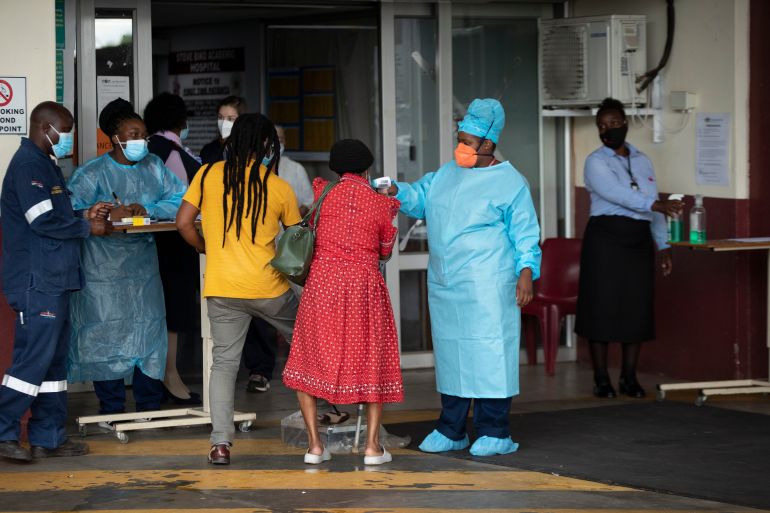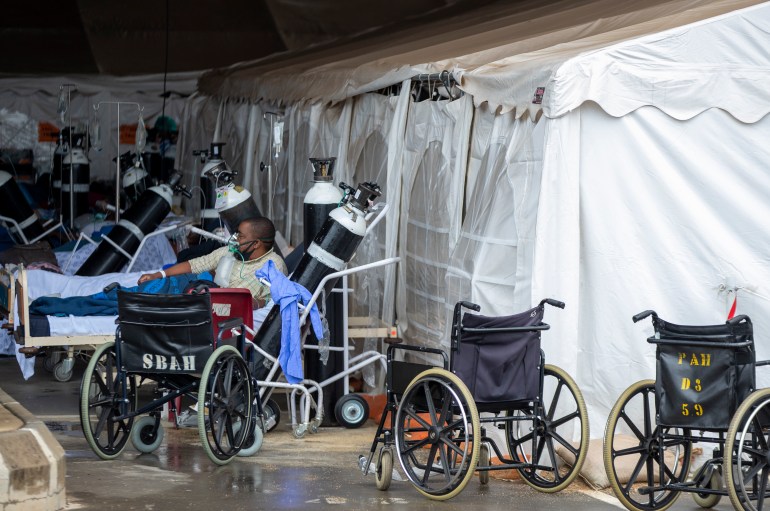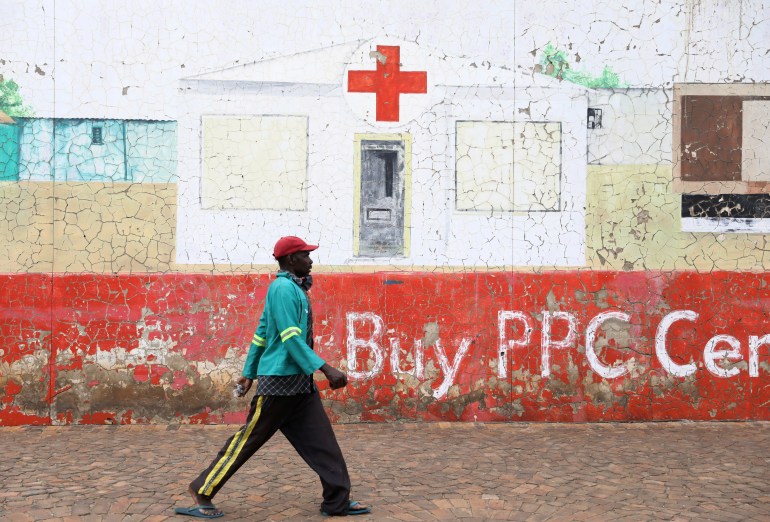South Africa struggles against ‘relentless’ COVID-19 surge
Hospitals overrun as infections spiral, prompting authorities to tighten coronavirus restrictions.

Johannesburg, South Africa – South Africa’s health services are buckling under the strain of soaring COVID-19 infections driven partly by a new variant of coronavirus spreading across the country.
Medical professionals warn that the “relentless” infection wave that has seen more than 130,000 new COVID-19 cases and 4,000 related deaths in the last week alone threatens to overrun both public and private hospitals.
Keep reading
list of 3 itemsUK, South Africa COVID variants found in dozens of countries: WHO
South Africa tightens restrictions amid surge in COVID cases
“As soon as beds open, there are more than 10 people waiting to fill them – we cannot cope,” a medical officer working at Chris Hani Baragwanath Hospital in Johannesburg told Al Jazeera.
“This has been relentless and far worse than the first wave of infections.”
The new variant, referred to as 501.V2, has been found in all of the country’s nine provinces, as well as beyond the country’s borders, leading several countries to ban flights from South Africa.
The variant has been associated with a higher viral load, leading some scientists to believe it is more transmissible and possibly a major contributing factor in the surge in infections.
Others, however, urge caution as more studies are being carried out, with some officials blaming the current surge in infections to a lack of adherence to coronavirus containment measures and “superspreader” events during the festive period.
In late December, the government placed the country under “level three” lockdown restrictions – banning alcohol sales again and re-enacting an overnight curfew – in an attempt to stave off infections.
Public gatherings were also discouraged, funerals limited to no more than 50 people and the reopening of schools this month was pushed back to mid-February.
Meanwhile, President Cyril Ramaphosa announced earlier this week the closure of all of South Africa’s 20 land entry points, in a move prompted by the formation of snaking, kilometres-long queues at the country’s borders as migrants attempted to return from neighbouring countries after visiting their home countries during the festive period.
“This [congestion] has exposed many people to infection as they wait to be processed; and it has been difficult to ensure that the health requirements for entry into South Africa are met. Many people are arriving without proof of COVID-19 tests,” Ramaphosa said on January 11.
The borders will remain shut until mid-February, with only those transporting cargo, diplomats, returning South African nationals, permanent residents and foreigners with a valid visa allowed to pass. All hoping to cross are required to show a negative COVID-19 PCR test within 72 hours of arrival at the border.
“People are unable to seek care or even access sanitation and water because they’re stuck in long unmoving lines and may exacerbate the risks of creating superspreader events for COVID-19,” Vinayak Bhardwaj of Doctors Without Borders told Al Jazeera.
South Africa’s Home Affairs department has sent extra personnel to the country’s busiest land ports to alleviate congestion, while authorities have arrested hundreds of people who entered the country from neighbouring Zimbabwe, Mozambique, eSwatini and Lesotho by scaling fences and crossing rivers, as well as forging fake travel documents and PCR tests.
Amir Sheikh, of the African Diaspora Forum, described the ban as “disastrous”.
“People are making their way back to their homes by whatever means necessary,” he told Al Jazeera. “Just because they are not South African does not mean their lives are not here. Some people disallowed access have called this country home for decades.”
The curbs came as the economic effects of one of the world’s strictest lockdowns – with large swaths of the economy shuttered for most of 2020 – have begun to be felt. More than 2.2 million jobs were shed during the second quarter of the year alone, with the South African Reserve Bank projecting a 6.1 percent drop in the country’s gross domestic product (GDP) in 2020.

‘Uncertain future’
Meanwhile, after the government was engulfed in corruption scandals emanating from distribution of personal protective equipment and food parcels during the initial stages of the pandemic, discontent is now also fomenting over South Africa’s plans to procure and distribute COVID-19 vaccines.
The government is aiming to inoculate two-thirds of South Africa’s 59 million population within the next 18 months, but some medical experts say the goal is unrealistic due to the country’s already overstretched resources and apparent tardiness in securing an adequate supply of vaccine doses.
An initial 1.5 million doses of the Oxford University-AstraZeneca vaccine have been earmarked for front-line healthcare workers and are expected to arrive from India as early as February.
The government has also announced that 20 million vaccine doses will arrive in South Africa during the course of 2021 but details over their sourcing and cost remain elusive, sparking criticism from scientists, civil society and opposition parties that authorities have been slow off the mark in the global race for inoculations.
“Vaccines may be ready for deployment after months of rapid research around the globe. But if South Africa is unable to acquire enough vaccines, it leaves the country with an uncertain future as to how the coronavirus crisis will come to an end,” said Dr Shabir Madhi, professor of vaccinology at the University of Witwatersrand in Johannesburg.
In total, South Africa has registered more than 1.3 million coronavirus infections and at least 36,851 related deaths. However, these are only the confirmed figures. Government-released statistics at the beginning of January showed a spike of almost 20,000 fatalities in December year-on-year, with 55,676 deaths logged last month compared with 38,620 a year earlier.
